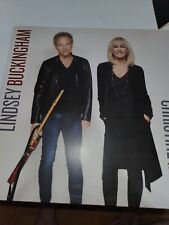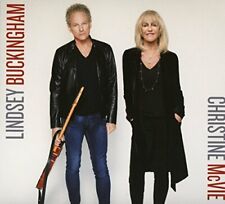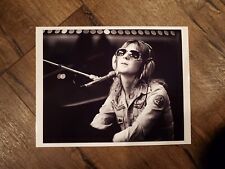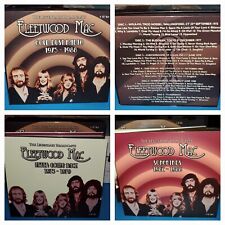|
Mick Interview (Albany Times Union) Albany Times Union (NY)
November 16, 1990 Section: Living ONLY MYSTERY LEFT IS WHY MAC BREAKING UP Harry Sumrall Knight-Ridder SAN FRANCISCO By now, you must have heard the rumors. Not "Rumours," the album that made Fleetwood Mac a '70s megaband, but rumors, as in reports that Stevie Nicks and Christine McVie would be leaving the group. "It's not a rumor anymore," drummer Mick Fleetwood says, rolling his eyes conspiratorially. "It's official. The girls will play the rest of the (U.S.) tour. But the last night of the tour, Dec. 7, will be their last performance as members of Fleetwood Mac." That might be official, but the why of it is the subject of, well, rumors. Which is why, to a certain extent, a reporter caught up with Fleetwood, 43, ensconced in baronial splendor in a posh suite at San Francisco's Stanford Court Hotel. Officially, he is on a tour of his own, to plug his new book, "Fleetwood: My Life and Adventures in Fleetwood Mac" (Morrow, $17.95), and with the group, which is scheduled to appear Saturday at the Knickerbocker Arena, Albany. Unofficially, he is responding to speculation that Nicks' departure was precipitated by the book, in which he writes about their past love affair. "People have construed that about the book," he says, "but Stevie didn't quit because of it. That is nothing but tommyrot. "When I decided to write the book, I said that no one in the group could read it (before it was published). At the time that Stevie decided to quit, she hadn't read it. I think she and Christine just decided that it was time for them to leave. "Stevie has a very successful career of her own, and she wanted to devote more time to it. And she wants to adopt a child and slow her life down. Christine recently bought a farmhouse in England, and she wants to settle down and pursue her music and painting. That's it as far as we are concerned. The book had nothing to do with their decision to quit." He uncoils his long frame and leans across the table. "As far as what I wrote about me and Stevie, I don't think she had a problem. We were very much in love. I think she wished that I had written more." He laughs the risque laugh of the Elizabethan rake he resembles. The longish beard is going gray at the sides; the hair is pulled back in a ponytail; the black and white polka- dot socks, black-trimmed vest and dotted shirt offset by the gold Rolex, gold earring, gold bracelet and gold rings all combine to give him the air of a postmodern swashbuckler. All of this comes with facial expressions, rolling eyes, arching brows and various contortions of his rather expansive forehead, which work in rhythm with his words, the way a high-hat cymbal clicks in counterpoint to a bass drum. But then that's all brought under tight control, as he becomes all business to talk about business. "The plan right now," he says, evenly, "is for the girls to play on the next album. But no more tours. We haven't really talked about it a hell of a lot, but there is no question that the band will continue." As the band has for the past 23 years. Its sensationalistic aspects notwithstanding, "Fleetwood" is a stirring account, not only of Fleetwood Mac's considerable role in pop history, but of the durability of its founders and namesakes, Fleetwood and bassist John McVie. In those years, the group has endured numerous scandals, setbacks and successes, all of which Fleetwood writes about with good-natured aplomb. There were the years in the late '60s - "our blue period," Fleetwood says - when the group was in the vanguard of the British blues boom. At that time, it hit the top of the British charts with its debut album and became a fixture on the European scene. Then there were the directionless years at the start of the '70s when Fleetwood Mac abandoned the blues and went through a dizzying array of lineups. And the mid-'70s, when Nicks and Lindsey Buckingham hooked up and the group produced the mega-platinum "Fleetwood Mac" album and its 1977 successor, "Rumours," which became the biggest album of all time to that point, eventually selling more than 20 million copies. Along the way, as the book recounts, there were an almost Spinal Tap-ian array of characters and events and escapades. There was one of the group's first stage props, Harold the Dildo, affixed to Fleetwood's drum. And guitarist Jeremy Spencer, who filled condoms with milk and attached them to his guitar and who did a mean Elvis imitation in a gold lame suit. On the darker side, there were the marital breakups of John and Christine McVie, and Mick and first wife Jenny Boyd (he now lives with wife Sara in Malibu), and the split of Nicks and Buckingham, all during the recording of "Rumours." And earlier there was the self-destruction of the group's original guitar genius, Peter Green, who grew weary of fortune and fame and wound down into madness, as did another guitarist, Danny Kirwan. Spencer took his leave of the group in the '70s, apparently after being recruited into a religious cult, the Children of God, on the streets of L.A., quitting a tour without notice. "It is rather odd, isn't it?" Fleetwood says, brows arching. "And they were all guitarists. I think Lindsey (who quit in 1987) got out of the group just in time!" Fleetwood Mac. 8 p.m. Saturday.
|









![Christine McVie - Christine Mcvie (reissue) [New CD] Reissue picture](/vintage/img/g/tm8AAOSwpQxgrse5/s-l225/Christine-McVie-Christine-Mcvie-reissue-New-CD-Rei.jpg)